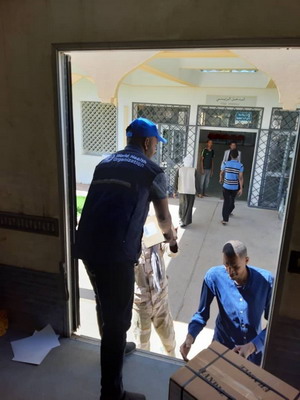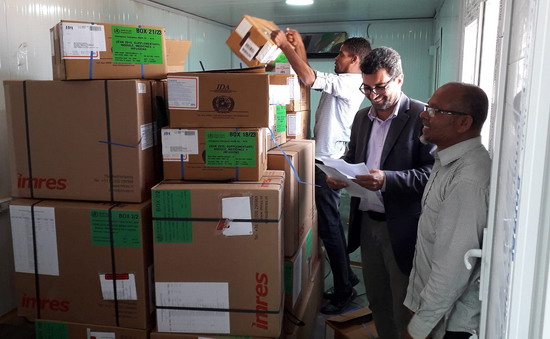 The supplies were funded by the governments of Germany and Italy, as well as the U.S. Office of Foreign Disaster Assistance and the Central Emergency Response Fund of the United Nations
The supplies were funded by the governments of Germany and Italy, as well as the U.S. Office of Foreign Disaster Assistance and the Central Emergency Response Fund of the United Nations
21 May 2019, Tripoli, Libya—WHO has delivered medicines and medical supplies to health facilities across Libya to meet shortages amid intense conflict in the country’s capital. The shipments, sufficient for more than 600 000 beneficiaries, include emergency medical supplies, trauma kits to treat injured patients, and medicines for chronic and infectious diseases.
Included are insulin and blood glucose test strips, as well as medicines to treat asthma and high blood pressure. Medicines for respiratory infections are also part of the shipments, as increasing cases have been reported through the WHO-supported disease surveillance and rapid response system.
 Health facilities in Libya receive medical supplies
Health facilities in Libya receive medical supplies
The medical supplies have been received by more than 35 primary health care facilities and main hospitals across Libya, including areas inside Tripoli where many displaced people are sheltering, as well as hospitals that are receiving casualties from the fighting.
“The conflict in the capital has created many logistical challenges preventing health facilities from receiving supplies, so this distribution is a major breakthrough,” says Dr Syed Jaffar Hussain, WHO Representative in Libya. “We’re making sure that critical gaps at health facilities are covered so that patients will have the medicines they need to get well. These supplies will cover the needs of health facilities for the next 3 months.”
Even before the crisis in Tripoli escalated in April 2019, medical supplies often ran short in Libya. The current conflict has closed roads, damaged ambulances, limited airplane traffic, caused a sharp rise in the price of petrol, and created many other obstacles to providing supplies and health care to patients.
With cases of malaria also confirmed in Libya recently, WHO has also donated anti-malarial drugs to the national centre for disease control.
“We have been monitoring the health needs of thousands of people who fled their homes due to bombing in Tripoli, and who are now living in centres for the displaced,” says Dr Hussein Y. Hassan, Health Emergencies Lead for WHO Libya. “Many are suffering from chronic diseases and their treatments were interrupted by the ongoing displacement. These supplies will make sure that many patients are now able to resume the life-saving treatments they need.”
The supplies, many of which were shipped from WHO’s logistics hub in Dubai, were funded by the governments of Germany and Italy, as well as the U.S. Office of Foreign Disaster Assistance and the Central Emergency Response Fund of the United Nations.
 Health facilities in Libya receive medical supplies
Health facilities in Libya receive medical supplies
In addition to its emergency response work, WHO helps improve the health of people living in all areas across the country. WHO sends Emergency Medical Teams with surgical capacities to treat patients who have little access to care, supplies health facilities with essential medicines, and trains Libya’s health workers to prevent and control diseases.
Related links
U.S. Office of Foreign Disaster Assistance
Central Emergency Response Fund of the United Nations


